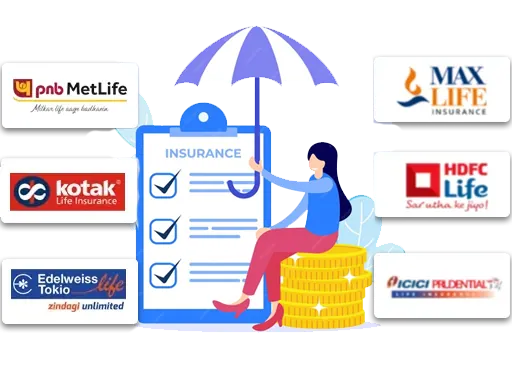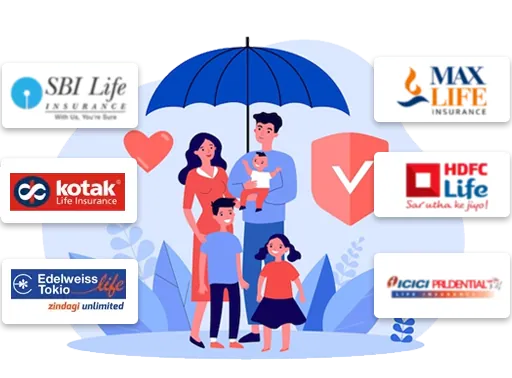- Section 80C & 80D
- Eligibility criteria for tax benefits
- Exclusions

I am a passionate content writer with over three years of experience in the insurance domain. An avid learner, I always tries stays ahead of the industry's trends, ensuring my writing remains fresh and includes the latest insurance shifts. Through my work, I strive to engage with targeted insurance readers.
Reviewed By:

Priya has been in the content writing industry for over 9 years. She has been religiously following the insurance sector since the start of her career which makes her an avid insurance expert. Her forte lies in health, term, and life insurance writing, along with her knowledge of the latest developments in the insurance sector.
Updated on Jan 05, 2024 5 min read




Term Insurance Under 80C and 80D
A term plan is a pure risk insurance plan that gives financial support to the dependents in case of the policyholder's demise during the policy term. Term insurance provides insurance coverage at a lower premium rate.
Term insurance comes with many benefits such as various death benefits, options to add riders, disease-specific coverage, the option of receiving the paid premiums back, and much more. One important benefit that term plans come with is the tax-saving component. Term insurance plans allow the policyholder to enjoy tax exemptions on the premiums that they pay.
Let us understand whether term insurance comes under 80C or 80D of The Income Tax Act.
What are the Term Insurance Tax Benefits Under Sections 80C and 80D
Term insurance includes tax benefits under sections 80C and 80D of the Income Tax Act of 1961. According to this act, any individual or a Hindu undivided family (HUF) can opt for term insurance benefits to save money. Both sections come with the following tax-saving limits:
- Section 80C : offers tax benefits up to Rs 1.5 lakh of the total premium paid which should be less than 10% of the sum assured.
- Section 80D : offers tax benefits of up to 25,000 on taking health riders like critical illness for yourself and Rs 50,000 for parents above 60 years with term insurance.
What is the Eligibility Criteria for Claiming Tax Benefits Under Section 80C?
For claiming the tax rebate under section 80C, one should be represented as a:
- Individual
- Hindu undivided family(HUFs).
- Minimum policy holding duration of 2 years.
Apart from these, nobody can rebate tax deductions under section 80C such as business entities, firms, etc.
How do I Claim Tax Benefits for Term Insurance Under Section 80C?
An essential term insurance policy gives you tax benefits up to rupees 1.5 lakh per year, according to the 1961 Income Tax Act, only if the total premium paid is less than 10% of the total sum assured.
Section 80C offers deductions on instruments like PPF, EPF, ULIP, and ELSS. Also, payments like repayments of home loans, children's tuition fees, and term insurance premiums.
Let us See How You Can Get a Tax Rebate Under Section 80C
Suppose Rohan, an IT Professional, has an annual package of 15 LPA. So, as per the latest income tax slab, he falls under the tax slab of 25%. After multiple deductions, Rohan still falls under the 25% bracket. A friend of Rohan's suggests purchasing term insurance, which provides financial support in Rohan's absence and helps him save on taxes.
Rohan purchases term insurance with a 5 crore sum assured, paying premiums of 1 lakh 20 thousand per year. So, Rohan directly falls into low-income tax brackets or gets a tax rebate of up to 1 lakh 20 thousand on his income.
What are the Eligibility Criteria for Claiming Tax Benefits Under Section 80D?
For claiming the tax rebate under section 80D, one should be represented as a:
- Individual
- Hindu undivided family (HUFs).
- Minimum Policy holding duration of two years.
Apart from these, nobody can rebate tax deductions under section 80D such as companies, firms, etc.
The table below shows the deduction amount available to individual and HUF families under various scenarios.
| Policy taken for | Deduction for self and family | Deduction for Parents | Maximum claimable Deduction |
|---|---|---|---|
| Self or family (Age below 60 years) | 25,000 | - | 25,000 |
| Self or family and parents (All below 60 years) |
25,000 | 25,000 | 50,000 |
| Self or family (Below 60 years) Parents (Above 60 years) | 25,000 | 50,000 | 75,000 |
| Member of HUF (Below 60 years) | 25,000 | 25,000 | 25,000 |
| Member of HUF (A Member of above 60 years) | 50,000 | 50,000 | 50,000 |
How do I Claim Tax Benefits for Term Insurance Under Section 80D?
Section 80D of the Income Tax Act 1961 deals with health insurance policies. But do you know that you can get a tax rebate from it even on a term insurance policy?
Under Section 80D of the Income Tax Act 1961, you can get a tax rebate of up to INR 25,000 if you opt for a term plan with health insurance riders like critical illness.
You can claim a deduction of up to INR 50,000 under Section 80D of the Income Tax Act, 1961 if you purchase term insurance with health riders for your parents of an age above 60 years.
Let us See How You Can Get a Tax Rebate Under Section 80D
Suppose Aman, a teacher, has an annual package of 10 LPA. As per the recent tax slab, he falls under the 15% tax bracket. Aman is a responsible man. He already purchased term insurance with health riders for his family’s welfare. As per the rule, he claims a tax rebate of Rs 25,000 on term insurance for himself, his wife, and children and Rs 50,000 for parents above 60.
So, Aman gets a combined tax rebate of Rs.75000 for the critical illness riders taken with term insurance.
Exclusions under sections 80C and 80D of the Income Tax Act:
So, you know all about deductions under sections 80C and 80D; let's find out about the exclusions:
- If the policyholder did not pay the premium regularly, he is not eligible to claim tax deductions.
- If the insurance policy is provided by the employer, he/she is not eligible for tax deductions.
- If the policyholders pay their premiums in cash, they are not eligible for tax deductions.
Conclusion
Term insurance is one of the most efficient products to secure the family financially in your absence while giving you additional tax benefits on your hard-earned income. By understanding and gaining knowledge of tax benefits in term insurance, you will have better financial planning, which will help you save money.
Term Insurance Under 80C and 80D : FAQs
1. Is term insurance premium tax-free in India?
Premiums of term insurance are not tax-free. However, according to Income Tax 1961, you can claim a tax deduction up to rupees 1.5 lakhs on the premiums paid.
2. What are the exemptions of term insurance in income tax?
Term insurance exempts income tax under section 80C of the Income Act 1961 up to 1.5 lakhs.
3. Is term insurance claim taxable in India?
Term insurance claims are tax-free in India only if the nominee fulfills at least one condition under section 10D of the Income Tax Act.
4. Which section does life insurance come under?
Life insurance comes under section 80C of the Income Tax Act 1961.
5. What are tax exemptions under section 80D?
Premium paid for health insurance offers tax exemptions up to rupees 25,000 under section 80D of the Income Act 1961.
6. Which Section covers term insurance?
As per the Income Tax Act 1961, Term insurance falls under section 80C, and taxpayers can get tax rebates of up to 1.5 lakh per year on the total premiums paid.
Other Term Insurance Companies
Share your Valuable Feedback
4.6
Rated by 857 customers
Was the Information Helpful?
Select Your Rating
We would like to hear from you
Let us know about your experience or any feedback that might help us serve you better in future.


Written By: Varun Saxena
I am a passionate content writer with over three years of experience in the insurance domain. An avid learner, I always tries stays ahead of the industry's trends, ensuring my writing remains fresh and includes the latest insurance shifts. Through my work, I strive to engage with targeted insurance readers.






 Reviewed By: Anchita Bhattacharyya
Reviewed By: Anchita Bhattacharyya

4493-1741698074.png)
4509-1741341976.png)
4391-1741255269.png)


4430-1740390818.webp)











Do you have any thoughts you’d like to share?